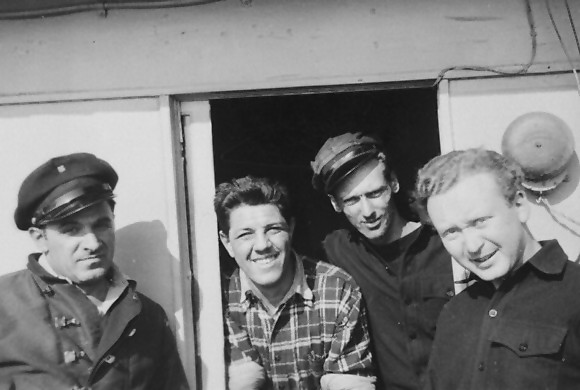|
At the end of WW-II, the American & Canadian Jewish community became aware of the struggle of
the Yishuv – the Jewish community in Eretz Israel – against the severe
restrictions that the British Mandate authorities imposed on Jewish
immigration, and they heard about Aliya Bet (a.k.a. ‘Ha’apala) – the large-scale enterprise aimed at breaking the British blockade and bringing
the Jewish refugees from Europe to Eretz Israel. Over 250 young people put aside their study plans or career pursuits,
and joined the Hagana in service of Ha'Mossad Le’Aliya Bet --
the Yishuv’s organization in charge of Aliya Bet -- as volunteers, manning the ships
that the Mossad procured in the U.S.A and Canada. These people were called the Machalniks (‘Mitnadvei Chutz L'Aretz' - the
'volunteers from outside Israel' in English translation) of Aliya Bet.
Not much publicity has been given inside Israel to the contribution of these volunteers, and the editors of this website are
happy to correct this situation by publishing their stories here. In particular, we maintain a special memorial page
(Izkor) for the ten fallen volunteers who participated in Aliya Bet
activities (this page appears in the Hebrew section of the website).
The volunteers were quite diverse in terms of family background, occupation, place of residence, socio-economic status, etc. The minority of them were members of Zionist Youth Movements who
viewed the volunteering also as an opportunity to make Aliya (immigrate) to Eretz Israel/Palestine (for example, the volunteers of ‘Wedgwood’ and ‘Hagana’;
see the story of Aryeh Malkin). But most of them came to help their people and as soon as their mission was over returned to the USA and
the communication with them was lost.
The ships mentioned above, which were bigger and in better technical shape than the ships used before, completely changed the scope of Aliya Bet and the number
of ma'apilim (illegal immigrants) involved. No more there were only small and dilapidated vessels/schooners of a
tonnage of only few hundreds tons capable of carrying only few hundreds
immigrants, but rather massive ships capable of carrying thousands of
immigrants. The 10 "American ships" of Aliya Bet were (in their arrival order): ‘Wedgwood’ (Jun. '46), ‘Hagana’ (Jul. '46), ‘Haim Arlozorov’(Feb. '47),
‘Ben Hecht’ (Mar. '47; the only non-Mossad/Hagana ship in Aliya Bet after WW-II), ‘Hatikva’ (May '47), 'Exodus' (Jul. '47), ‘Ge’ula’ (Oct. '47),
‘Medinat Ha’yehudim’ (Oct. '47), and the two 'Pans' (Jan. '48) -
‘Hatzma’ut’(Pan Cresent) and ‘Komemiyut’ (Pan York).
The contribution of the Machalniks in general was not limited just to Aliya Bet. Machalniks took a respectable part in Israel's War of Independence
(click here for more details), and those among them
with naval experience made a significant contribution to the young Israeli Navy. With respect to this, one should mention Paul Shulman (Shaul Ben-Tzvi), who was the
first commander of the Israeli Navy.

Machalniks from the Exodus (from right): Bill Bernstein, Paul Yarin, Bill Millman, Mike Weiss

A plaque commemorating MACHAL in Aliya Bet
Clandestine Immigration and Naval Museum, Haifa, The Palmach Museum, Tel Aviv
and several Holocaust Museums in the U.S.A
Prepared and contributed by David Gottlieb, a volunteer aboard the 'Josiah Wedgwood'
Designer: Theresa Thornhill
|
|






